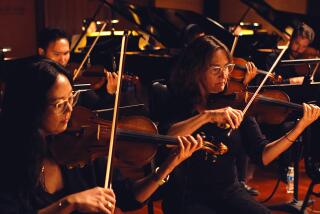The 5 Brownsâ sibling wizardry
For the 5 Browns, a quintet of sibling piano virtuosos who will play Mozart, Saint-SaĂŤns and Mussorgsky in Irvine, classical music skill is all in the family.
Many parents dream of their children mastering a serious instrument â middle-class homes across America are filled with gleaming, stately pianos bought with high hopes and left unplayed, even untuned â for years.
So how did the parents of the 5 Browns â a beaming quintet of piano virtuosos who record and perform together with palpable pleasure â beat the odds?
âIt was never intended to turn out like this,â says Gregory Brown, 29, who has been playing now for 25 years. âMy mom says she just wanted to find something for us to do instead of annoying her â like drawing on the walls and stuff. At some point, it just became part of our identity, both as individuals and as a family, and we started entering competitions and so on.â
The fruit of their labors is a busy touring schedule that will bring them to Orange County on Saturday for a performance of Mozart, Saint-SaĂŤns and Mussorgsky at the Verizon Wireless Amphitheater in Irvine.
Born in Houston and raised in Utah, the Browns were home-schooled by Steinway-owning Mormon parents and encouraged to study piano from the age of 3. âNo kid, of course, wants to practice,â Gregory says, so their parents pushed them a little at first. As early teens, they each had to commit. âIt canât be for your teacher anymore, or your parents anymore â itâs got to be for you.â
Seeing the eldest of the Brown siblings, Desirae, pursue the instrument with such success made it easier for the other kids to jump in. âI looked up to my older siblings a lot,â says Ryan, at 26 the youngest. âAnd it seemed like the cool thing to do since they were doing it.â (The other members of the group are Deondra and Melody.)
Gregory was compelled at first by Chopin and Mozart; Ryan by Rachmaninoff and Prokofiev. They grew up listening to rock music as well, and all five share a fondness for Coldplay.
Their upbringing was not entirely wholesome: The Brownsâ father, Keith Brown, who once managed the group, recently pleaded guilty to sexually abusing his three daughters and in March was sentenced to 10 years to life and is now in Utah State Prison. The family declined to comment on the matter.
No need for leader
All five of the Browns attended Juilliard, and while in New York, they regrouped, rehearsing together and eventually recording as one.
âWhen we started out as a group about seven or eight years ago,â says Gregory, âwe made a conscious decision to not have a leader â to make sure it was five 20 percents of a whole. In our early years it was a little tricky, as with siblings, the older ones would take charge, the younger ones could fall under the radar. But that didnât really persist.â
Says Ryan: âAll five of us were trained as soloists, so when we came together as a group, we told each other we had to put our egos aside and work together as a group.â But they didnât want to give up their individual ambitions: Most concerts see the group playing together, as a chamber quintet, with some solo and duet arrangements as well. âWe see it as the best of both worlds,â says Ryan. âItâs nice to be able to change up for us, and for the audience as well.â
Their attitude and novelty have led them to get traction in places classical music does not always reach: In 2002, People magazine called the group âThe Fab Fiveâ and they were favorites on âThe Oprah Winfrey Show.â
The 5 Browns were raised Mormon, and the faith still has meaning to them. âMusic is an inherently spiritual thing,â Gregory says. âWe feel our spirituality, our music and our family have cohered in a lot of ways.â
These days theyâre working on a five-piano version of âRite of Springâ that they hope to perform next year; in August theyâll perform the world premiere of a Nico Muhly piece for orchestra and five pianos with the Chicago Symphony Orchestra at the Ravinia Festival.
Whatever theyâre playing, Ryan says the most important thing for them is âjust trying to spread the music.â
âWe try to make a point by dressing a little less stuffy and getting rid of some of the classical etiquette,â he says. âWe want people to be relaxed at our concerts. We talk to audiences a little bit before the concert, tell them a little about the piece, and meet people after the concert as well. We love the music so much; we hope that comes across.â
More to Read
The biggest entertainment stories
Get our big stories about Hollywood, film, television, music, arts, culture and more right in your inbox as soon as they publish.
You may occasionally receive promotional content from the Los Angeles Times.










